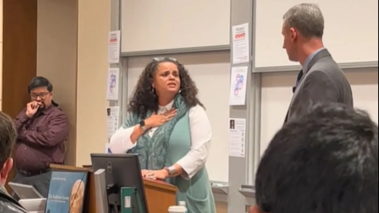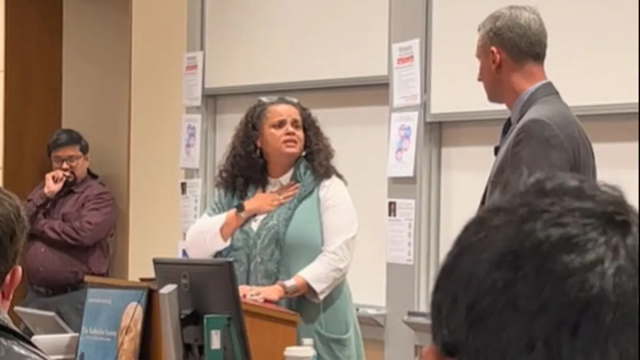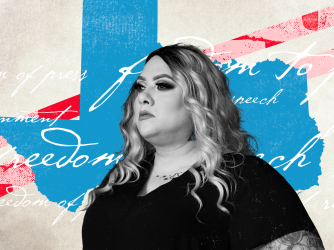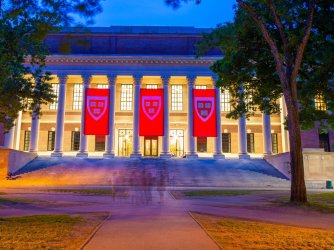Table of Contents
Stanford Law hecklers demanding ‘free speech’ don’t know what they’re asking for

Twitter.com
Stanford's associate dean for DEI, Tirien Steinbach (left), speaks to Judge Kyle Duncan (right) during a Federalist Society event that was disrupted on March 9, 2023.
The free-speech fallout at Stanford Law School continues after last Thursday’s headline-making, administrator-endorsed shoutdown of a federal judge by students who said his views were too “harmful” to be aired on campus.
Hundreds of students dressed in black and donning face masks emblazoned with the words “counter-speech is free speech” lined the halls of Stanford Law on Monday to protest Dean Jenny Martinez’s subsequent apology to Fifth Circuit judge Stuart Kyle Duncan for the treatment he received when he attempted to speak at the school last week.
The Washington Free Beacon’s Aaron Sibarium reported that the whiteboard in the classroom where Martinez teaches constitutional law was covered in flyers defending the students who shouted down Duncan.
And when Martinez’s class adjourned at 11 a.m., Sibarium said, “[p]rotesters, dressed in black and wearing face masks that read ‘counter-speech is free speech,’ stared silently at Dean Martinez as she exited [the room.]”
The same report said nearly a third of the law school joined Monday’s protest. Additional reporting by Fox News said hundreds of black-clad students surrounded the dean:
“They gave us weird looks if we didn't wear black” and join the crowd, first-year law student Luke Schumacher said. “It didn't feel like the inclusive, belonging atmosphere that the DEI office claims to be creating.”
Another student, who requested anonymity for fear of retaliation, said the experience was “eerie.”
”The protesters were silent, staring from behind their masks at everyone who chose not to protest, including the dean,” the individual said.
Of course, this kind of peaceful protest is protected by Stanford’s strong free speech policies — the same policies that also protected Duncan’s speech when these students demanded that his speech be canceled due to the “harm” his appearance and message would cause to Stanford.
FIRE routinely defends the free expression rights of both invited speakers to speak and student protestors to protest a speaker.
As FIRE wrote yesterday, Duncan, a judge on the U.S. Court of Appeals for the Fifth Circuit, was invited to speak at a Federalist Society-hosted event, “The Fifth Circuit in Conversation with the Supreme Court: Covid, Guns, and Twitter,” last Thursday at Stanford. But when Duncan attempted to speak, he was shouted down and heckled by student protestors. When the judge eventually requested that a university administrator restore order, Associate Dean for Diversity, Equity, and Inclusion Tirien Steinbach stood up and delivered a prepared speech accusing the judge of harming students by his presence.

Stanford Law students shout down 5th Circuit judge: A post-mortem
News
Students at Stanford Law School disrupted a student-organized event featuring a federal appellate judge.
On Saturday, Martinez and Stanford President Marc Tessier-Lavigne issued a formal apology to Duncan for the disruption to his Thursday speech. The letter said the students’ right to protest did not include disrupting an event and acknowledged Steinbach’s mishandling of the situation.
Several student groups issued statements in response expressing their anger at the apology and defending the actions of those who disrupted Duncan’s speech as merely the exercise of the students’ own First Amendment right to protest. And Monday’s student protest of Martinez followed.
Stanford’s own policy, as well as California’s Leonard Law, provides Stanford students First Amendment-like free speech rights. But contrary to the argument of the Stanford protestors on their masks and flyers, shouting down an invited speaker is not free speech. It’s a heckler’s veto — and it’s censorship.
Unlike the disruption of Duncan’s speech last Thursday, there is no evidence Monday’s protest of Dean Martinez was disruptive. Yet students protesting on Monday also demonstrated a profound misunderstanding of free speech and the First Amendment in their claims that silencing an invited speaker is within students’ free speech rights and that their dean was wrong to apologize for the event’s disruption.
FIRE routinely defends the free expression rights of both invited speakers to speak and student protestors to protest a speaker. FIRE also defends students’ right to ask pointed questions or make rude or uncivil comments during a Q&A session. But students’ right of protest does not include the right to disrupt an event to the point that it is unable to proceed as planned. Counter-speech can’t happen if the speaker is censored.
It’s clear that Stanford’s promises to enforce their non-disruption policies won’t be enough to ensure a thriving culture for discussion and debate on campus. Students have to know what free speech means, and that it is a force for good. The elite students of Stanford Law must come to learn that free expression is the most powerful tool for social change ever devised — one they could quite capably use to their advantage. But that won’t happen if they keep begging administrators to protect free speech rights only for them.
FIRE defends the rights of students and faculty members — no matter their views — at public and private universities and colleges in the United States. If you are a student or a faculty member facing investigation or punishment for your speech, submit your case to FIRE today. If you’re faculty member at a public college or university, call the Faculty Legal Defense Fund 24-hour hotline at 254-500-FLDF (3533). If you’re a college journalist facing censorship or a media law question, call the Student Press Freedom Initiative 24-hour hotline at 717-734-SPFI (7734).
Recent Articles
FIRE’s award-winning Newsdesk covers the free speech news you need to stay informed.

Good day for freedom of expression and rule of law at Supreme Court

Pledge allegiance or else: Maryland public school forces students and teachers to salute the flag

Broad ‘friend of the court’ support pours into Supreme Court for citizen journalist Priscilla Villarreal


